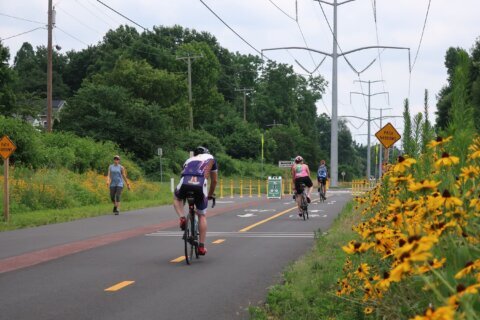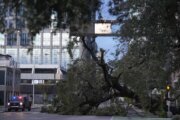WTOP celebrates National Hispanic Heritage Month this Sept. 15 through Oct. 15, with stories spotlighting the contributions, culture and accomplishments of Hispanic communities across the D.C. region.
As Americans, we rarely consider that we are blessed to have inherited a country that — despite its troubles — offers its people opportunity, inspiration and resources. However, immigrants from all over the world live in a reality where their very existence in their home country is a threat to their lives, forcing them to walk, swim or drag themselves to this country of opportunity.
Many find solace in communities where past generations of immigrants have set roots. One such community is located between Potomac Yard, Del Ray and Crystal City in Virginia.
Along Mt. Vernon Avenue, between S Glebe and W Glebe roads, lies the Chirilagua neighborhood. From the moment you cross the Four Mile Run stream, you can feel the energy change.
On any given Sunday, you will see a farmers’ market, street vendors, children playing and families running their weekend errands at their favorite “tienda Latina.”
Music can be heard on every block of the less than a mile long stretch, coming from boom boxes next to friends gossiping and from preachers offering words of inspiration. Walking along the sidewalk, the smells of bakeries and pupusa shops can’t be ignored.
The voices of shopkeepers, taking orders with the equivalent of a comforting Southern twang, is a sound that the heart hears before one’s ears.
WTOP spoke to many of those voices that call Chirilagua home.
Doña Flor has run the restaurant El Pulgarcito for the last seven years and lived in the area for 30. Nicknamed for a term of endearment for a boss, she said the neighborhood has changed dramatically in that time.
Years ago — in the 80s and 90s — some Hispanic people feared working in the area due to the dangers of leaving late at night.
Now, she says, most of her late-shift employees have no problem walking down the street at night — a sentiment echoed by most business owners in the area.
Doña Flor playfully calls the area “The United Nations” because of how diverse it is. While there is a Salvadorian majority, there’s not a country in Central and South America that isn’t represented.
El Pulgarcito founder Maria Ellena Ruiz Medino opened the colorfully decorated pupusa palace on Mt. Vernon Avenue in the late 90s. She was one of the nearly half million Salvadorians to migrate to America between 1980 and 1990.
Doña Flor calls Maria Ellena and her family “pioneers,” who worked hard and left a solid foundation for future immigrants to follow.
Half a block away is Marcela’s Bakery. Doña Marcela Cabrera, the owner, says nearly verbatim what Dona Flor said — that all “her girls” feel more than comfortable walking around, day or night because of how tightknit the community is.
“We have brothers and cousins that watch over us, it’s a community … it’s family,” she said.
Walking into the bakery, the first thing one notices is the smell — a sweetness in the air from the semitas, corn gruel and pineapple pastries.
Marcela herself is Bolivian and will soon be celebrating 20 years of business in Chirilagua. She went on to explain that the bakery — much like the neighborhood itself — is a melting pot.
People from every Central and South American country have something to bring to the table: Mexican bread puddings, Honduran Baleadas, Salvadorian quesadillas (and no they’re not like what you’re thinking).
Much like her bakers bring their favorite dishes, she said Hispanic people in America “can contribute in the economy and in education … even when they are (treated like) the ugly ducks.”
“Don’t forget your culture! Don’t forget your roots,” Cabrera said of the first and second-generation Americans in the neighborhood. “Even if you are here to better yourself, do so while honoring those who came before, and loving the roots that allowed your fruit to prosper.”
Behind the main strip of Mt. Vernon Avenue is Saint Rita’s Catholic Church. As mass let out, Manrique Blanco in his Sunday best, was excited to speak with us.
He spoke with pride and sometimes fear as the memories came to him: “I went from Chirilagua all the way to Chirilagua.”
According to the Center of Justice and Accountability, the U.N. and Reuters, 75,000 civilians died in the Salvadorian conflict between 1980 and 1991.
“Children, 8-9 years old, were just scooped up from their classrooms … men with missing limbs were a usual sight, airplanes shooting down at towns. … It was horrible. … They’d take the children and send them to the front lines because they considered those innocent creatures dispensable,” he said.
Manrique was 16 when he made his way to Arlandria — mashup of Alexandria and Arlington.
“I had no one, but it was a glimmer of hope. … Where if one had nothing to eat, someone might be kind enough to offer a plate,” he said, his almost lighthearted, matter-of-fact tone faltering, if only for a moment.
He went on to explain how it was thanks to community advocates, like the Tenant and Workers United grassroots organization, that even the poorest among them were able to afford living in the area.
According to their website, the Tenants and Workers United organization was brought together to fight “scheduled mass evictions of thousands of low-income renters in the Arlandria neighborhood of Alexandria.”
This resulted in the Arlandria-Chirilagua Housing Cooperative (ACHC) which allowed residents — with the help of the City of Alexandria, the U.S. Department of Housing, the Urban Development (HUD) and the Federal Reserve — to buy several apartment buildings in the area.
This included creating the ACHC, a “282-unit, limited equity housing cooperative, owned and democratically controlled by predominantly low-income residents.”
A block away from Saint Rita’s, across from the Birchmere parking lot, is now a huge development. On that lot a few months ago, were several Hispanic-owned businesses, including the restaurant El Cuscatleco (which has since moved to a new location), a grocery store and a barbershop for all. They have been torn down to make way for the new developments.
WTOP asked resident if they fear a similar fate — they fear nothing, many said.
“We know that at any moment we could be told it’s over. But like others have already done, we’ll keep pushing forward,” Doña Flor said.
“Oh, it’ll happen, it’s just a matter of time. It has happened in other neighborhoods and the community will do what it does best — adapt and support other,” Blanco added.
Get breaking news and daily headlines delivered to your email inbox by signing up here.
© 2024 WTOP. All Rights Reserved. This website is not intended for users located within the European Economic Area.








